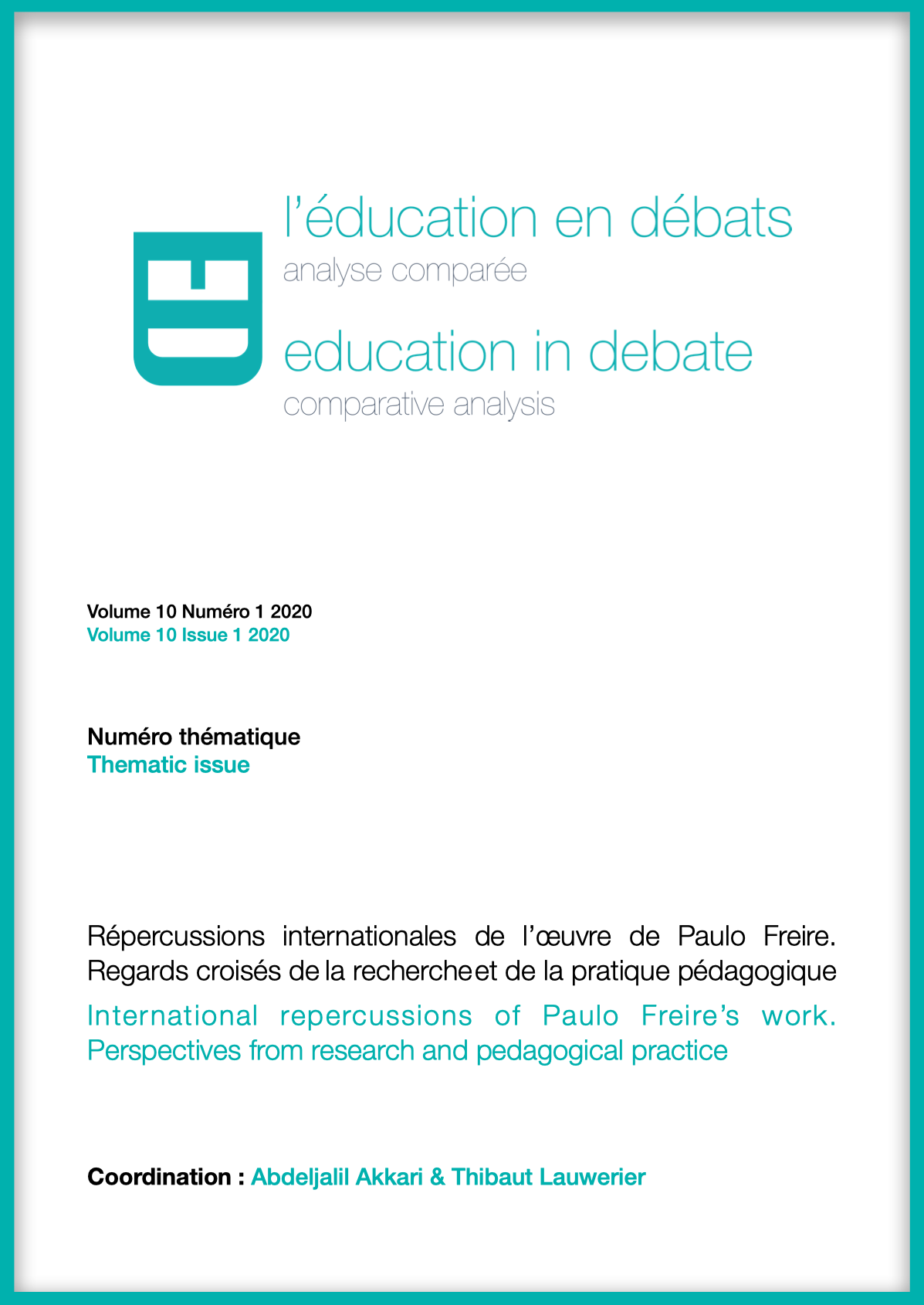Paulo Freire: el metodo de la concientización, en la educación, para analizar y comprender el contexto actual de la globalización
DOI:
https://doi.org/10.51186/journals/ed.2020.10-1.e280Abstract
Education as a cultural andpolitical response is widely context dependent and serves the need of transmitting knowledge, worldviews, values and attitudes in connection with the different social realities in which they are developed. In the current context of Globalization, education represents an opportunity to acquire critical awareness on social realities that allows one to analyze, understand and develop alternatives to current issues. Globalization poses significant challenges in terms of the preservation of the climate and biodiversity and the respect for cultural and religious diversity. The ethical and ecological challenges related to the preservation of human dignity allow us to strive towards a more just and caring society. Ideas determine our attitudes toward society, nature and the world. In this perspective, Paulo Freire’s vision is valid and relevant in so far as it attempts to respond to the great challenges of contemporary societies, aggravated by the Pandemic.
References
De Oliveira, X. S., Marín Gonzáles, J. & Dominguez Avila, C. F. (2019). Racismo ambiental. Ecología, Educação e Interculturalidade. Campo Grande: Life Editora.
Eribon, D. (2016). Principes d’une pensée critique. Paris : Fayard.
Freire, P. (1974). Pédagogie des opprimés. Paris : Ed. La Découverte.
Freire, P. (1978). La alfabetización y la conciencia. Porto Alegre: Editorial Emma.
Freire, P. (1987). La educación como práctica de la libertad. Rio de Janeiro: Paz e Terra.
Freire, P. (1984). Cartas a Guinea Bissau. Graba u experimento en el proceso. Rio de Janeiro: Paz e Terra.
Freire, P. (1980). Conciencia: La teoría y la prácttca de la liberación. (Antología). Sáo Paulo: Moraës.
Freire, P. (1990). La alfabetización -Lectura del mundo y lectura de la palabra. Rio de Janeiro: Continuum.
Freire, P. (1993). Política y educación. Ensayos. São Paulo: Editora Cortez.
Freire, P. (1995). Pedagogía: diálogo y conflicto. São Paulo: Editora Cortez.
Freire, P. (2000). Pedagogía de la indignación. Cartas pedagógicas en un mundo. São Paulo: UNESP.
Junod, R., Romagnoli, S. & Denevaud, J. M. (2017). L’inquiétude pour la pensée critique. Genève : IES Editions.
Marin, J. (1994). Ethnocentrisme et racisme dans l’histoire européenne dans la cadre de la conquête de l’Amérique et perspective actuelle. In C. Alleman Ghionda (Ed.), MultiKultur und Bildung in Europa. Multiculture et éducation en Europe (pp. 181-196). Berne : Peter Lang.
Marin, J. (2008). Globalization, Education, and Cultural Diversity. In P. R. Dasen & A. Akkari (Eds) Educational Theories and practices from the mayority World (pp. 346-366). Los Angeles, London, New York, Singapore: Sage publications.
Marin, J. (2010). Interculturalidade e descolonização do saber: relações entre saber local e saber universal, no contexto da Globalização. Visão Global, 12(2), 122-155.
Marin, J. (2015) Il gene no hanno colore. Rivista pedagógica culturaledel Movimento di Cooperazzione Educativa, 64(1), 64-68.
Marin, J. (2016). Eurocentrismo, racismo e interculturalidadeno contexto da Globalização. In A. Rodrigues Gómes, M. A. Meneses& J. Marin (Eds.), Novas Epistemes e Narrativas contemporánea(pp. 19-52). Campo Grande: Life Editora.
Marin, J. (2017). Parcours existentiels d’un anthropologue, entre Pensée critique et décentration culturelle. In R. Junod, S. Romagnoli & J. -M. Denevaud (Eds.), L’Inquiétude pour le monde et la pensée critique (pp. 72-75). Genève : IES Editions.
Marin, J. & Dasen, P. R. (2007). L’éducation face à la Mondialisation, aux migrations et aux droits de l’homme. In M. -C. Caloz-Tschopp & P. R. Dasen (Eds), Mondialisation, migrations et droits de l’Homme (pp. 285-320). Bruxelles : Bruylant.
Méan, A. & Bossy, M. (2002). La conscientisation à l’Ecole d’études sociales et pédagogiques. Lausanne : ESSP.
ONU. (2020). Rapport sobre Desigualdade social no BrasilConsultadoen http://www.todalapolitica.com/desigualdade-social-brasil
Oxfam. (2019). El 1% de los ricos acumulan el 82% de la riqueza global. Consultado en https://www.bbc.com/mundo/noticias-43776299
Piketty, T. (2013). Le capital au XXI Siècle. Paris : Editions du Seuil.
Quijano, A. (2014). Des/Colonialidad y Bien vivir. Lima: Cátedra América Latina.
Stiglitz, J. (2002). El malestar de la Globalización. Buenos Aires: Taurus.
Stiglitz, J. (2018). The price of inequality. And free fall. New York, NY: W. W. Norton and company.
Stiglitz, J. (2019). People, Power and profits. Progressive capitalismfor an age of discontent. New York, NY: W. W. Norton & Company.
Thomson, J. (2019). Synode, une affaire de vie. Consultado en https://www.choisir.ch/religion/eglises/item/3611-synode-une-affaire-de-vie
Vengermeren, W. (2020). O progresso da Redenção. A historia da salvação de criação a nova Jerusalem. São Paulo: Saeed Publicações.
Wallerstein, I. (2008). L’universalisme européen de la colonisation à l’ingérence. New York: Demopolis.
Ziegler, J. (2018). Le capitalisme expliqué à ma jeune-fille (en espérant qu’elle en verra la fin). Paris : Seuil.
Ziegler, J. (2019). Lesbos. La hônte de l’Europe. Paris : Seuil.
Downloads
Published
How to Cite
Issue
Section
License
Some rights reserved 2020 The Author(s)

This work is licensed under a Creative Commons Attribution-NonCommercial-NoDerivatives 4.0 International License.




